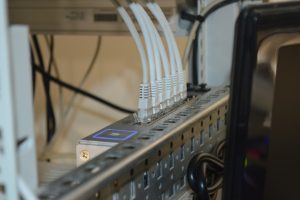Introduction to the Quantum Internet
The quantum internet is a revolutionary concept that envisions a network of interconnected quantum computers capable of transmitting, processing, and receiving information in quantum states. Unlike the classical internet, the quantum internet won’t replace our existing network but will provide unique functionalities such as quantum cryptography and unprecedented computational capabilities.
For instance, today’s internet facilitates the transfer of bits—data in the form of 0s and 1s. In contrast, the quantum internet uses qubits, which can exist as 0, 1, or both simultaneously due to a phenomenon called superposition. This capability lays the foundation for tackling computational problems that are beyond the scope of classical systems.
Foundations of Quantum Computing

The quantum internet relies on quantum computers, which process qubits instead of traditional bits. Qubits encode information in quantum states such as the spin of an electron or the polarization of photons. A key property of qubits is entanglement, where the states of two or more qubits are interconnected regardless of the distance separating them.
For example, entangled photons generated in a lab can maintain their link even when separated by hundreds of miles. This phenomenon is the basis for quantum communication and secure information transfer.
Benefits of the Quantum Internet
The quantum internet is set to revolutionize several fields. Its benefits include:
Unbackable Communication:
Using quantum key distribution (QKD), cryptographic keys can be shared securely over quantum networks. Eavesdropping attempts disrupt the quantum states, alerting users and ensuring data integrity.
Example: In 2021, QKD was used to secure voting data during elections in Switzerland.
Enhanced Computational Power:
Quantum networks allow multiple quantum computers to work together, solving problems like protein folding for drug discovery or optimizing supply chain logistics.
Scientific Advancements:
Quantum sensors connected via the quantum internet can improve tools like gravitational wave detectors, enabling deeper exploration of phenomena such as black holes.
Applications of the Quantum Internet

While the quantum internet is still under development, several applications are already taking shape:
Cryptography:
RSA encryption, a cornerstone of current cybersecurity, could be broken by quantum computers. The quantum internet offers a countermeasure with quantum cryptography, ensuring long-term data security.
Quantum Cloud Computing:
Instead of personal quantum computers, individuals will likely access powerful quantum systems remotely, much like cloud services today.
Example: A pharmaceutical company could use quantum cloud computing to model complex molecules for new medications.
Precision Measurements:
By linking quantum instruments, the quantum internet could enhance the precision of microscopes and telescopes.
Challenges in Building the Quantum Internet
Despite its promise, building a global quantum internet faces significant hurdles:
Signal Amplification:
Quantum signals cannot be amplified using conventional methods due to the no-clone theorem, which prohibits copying quantum states without altering them. Instead, researchers are exploring quantum repeaters to preserve data integrity across long distances.
Decoherence:
Qubits are highly sensitive to environmental disturbances, losing their quantum states when exposed to vibrations or temperature changes. Current quantum systems require near-absolute-zero conditions, though room-temperature qubits, such as defect spin qubits, show promise.
Example: Scientists at the University of Chicago have developed defect spin qubits using diamonds, maintaining quantum states for several seconds at cryogenic temperatures.
Infrastructure Limitations:
Physical connections, such as fiber-optic cables and satellites, are essential for transmitting quantum signals. While fiber optics are cheaper and widely available, satellite-based systems offer better scalability for global networks.
Regional and Global Quantum Networks
Significant strides have been made in creating quantum networks. The Chicago Quantum Exchange operates a 124-mile quantum loop connecting Argonne National Laboratory with the University of Chicago and other institutions. This network demonstrates the potential for regional quantum communication and serves as a testbed for scaling up to interstate and eventually global systems.
Future Prospects and Unknowns
The quantum internet is in its infancy, akin to the classical internet of the 1960s. As it matures, unforeseen applications will likely emerge, just as email, e-commerce, and social media transformed the classical internet. For now, its potential includes:
- Solving complex problems: From climate modeling to advanced material design.
- Global synchronization: Quantum clocks could maintain perfect time synchronization, crucial for technologies like GPS.
- Innovations in healthcare: Faster drug development and personalized treatments.
Ethical and Societal Implications

With great power comes great responsibility. The quantum internet poses ethical questions about access and monopolization. Will its benefits be equitably distributed, or will a few organizations control the technology? Moreover, while quantum cryptography enhances security, the ability of quantum computers to break traditional encryption raises concerns about privacy and digital security.
Conclusion
The quantum internet represents a profound leap in communication and computation. Its ability to connect quantum computers globally will unlock applications we cannot yet imagine, from unhackable encryption to revolutionary scientific discoveries. Though challenges remain, ongoing research and development are bringing this vision closer to reality. As history has shown, transformative technologies often begin as distant dreams but eventually redefine how we live and interact with the world.












